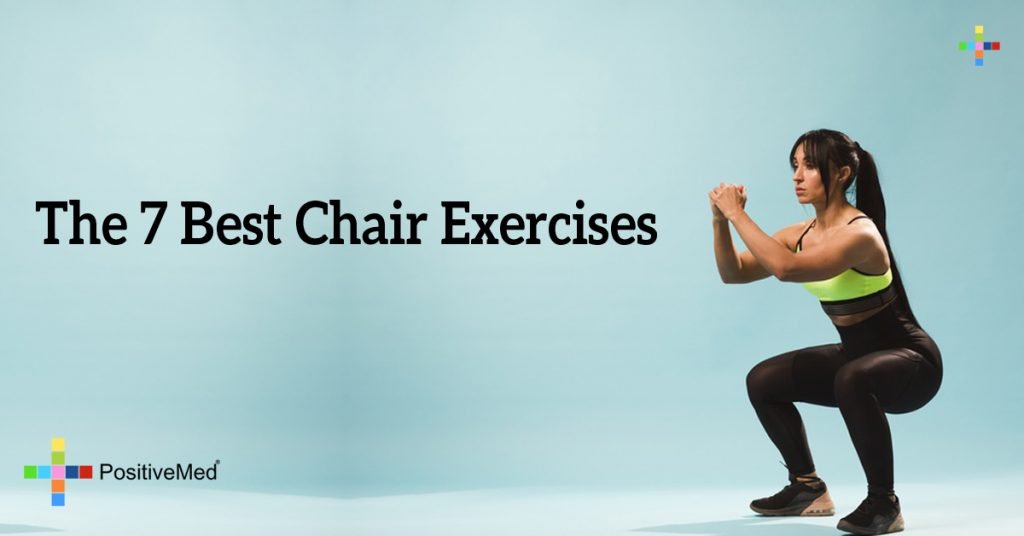
The 7 Best Chair exercises
By PositiveMed-Team
Edited By Stephanie Dawson
For people with limited mobility getting enough exercise can be difficult. For whatever reason, sometimes “get up and go” simply isn’t an option. There are also people who have sedentary jobs who find it difficult to find time in their schedules for exercise and their body is paying the price. Keeping active is important for heart health and overall well-being. It boosts metabolism, the cardiac system, and one’s endurance for everyday activities. With a steady exercise plan, most things during the day that have become tedious will become easier and less of a hassle.
If the following exercises include something you are not able to do, don’t sweat it! Adjust them according to your abilities. Remember, good back support is important during any exercise. If there is pain or discomfort, STOP. Pain does not mean you’re getting a good workout.
Gluteal Squeezes
Gluteal squeezes can be performed without anyone even noticing that you are exercising. Squeeze the glutes, otherwise known at the muscles that make up your butt, as tight as possible and hold for 10 seconds. Release the contraction and rest for five seconds before repeating the sequence for 10 repetitions. For isolation work, squeeze one side at a time holding for 10 seconds and then repeating on the other side.

Jumping Jack
Jumping jacks are a common cardiovascular exercise that works the extremities while also increasing heart rate and burning calories. Though these exercises are typically done while standing, one can use the same motion while seated by simply spreading their legs and lifting their arms above their head in the same way one would for a traditional jumping jack. Then, return arms to the sides and bring the feet back together. Don’t drag them, either, lift them completely off the ground as they’re moved apart and together.
Calf Raises
Seated calf raises are less intense than the standing version of calf raises because they do not require one to support their entire body weight. Sit with your back straight and feet flat on the floor. Contract the calf muscles and lift the heels up, keeping the balls of the feet in contact with the floor. Complete 20 repetitions, rest for 10 seconds and then repeat for two or three more sets.
Ab Crunches
Sit back in the chair, straighten your back. Crisscross arms over the chest. Begin crunching abs by pushing the chest down and out a bit until there’s a tightening in the ab muscles. Return to sitting up straight again. Crunch again in the same manner and repeat 6 times. Rest and complete as many sets of 6 as comfortable. Hold in the abs while crunching. A slight modification to increase the intensity is to crunch with arms extended and crossed over one another at the elbows. Avoid lifting the arms above shoulder height.
Arm and Shoulder Movements
Do arm and shoulder circles in both directions to work arm and shoulder muscles. Punch the air above your head, to your sides, in front of you and by your knees to work all of the arm muscles. Hold arms out from your sides and bend your elbows so your hands touch your ears to work your biceps. Point your elbows up at the ceiling and bend your arms to touch the back of your neck and then return to your starting position to work the triceps muscles along the back of your arm. Add dumbbells or resistance bands for a more challenging workout.’

At the Gym
Bench Work
Several exercises require lying on a bench, or can be modified to be performed that way. The classic bench press done with a barbell that targets the pecs is probably the best known. One can also press dumbbells bilaterally or unilaterally or do dumbbell flys. While there, work lats with lat pullovers, holding one dumbbell with arms extended above the chest and passing the weight back over your face and behind your head. Then, take the dumbbell in one hand for lying triceps extensions, done with the elbow pointing up toward the ceiling.
Seated Exercises
Sitting in a straight-backed chair or specially designed seat at the gym can help you keep your head, back and pelvis aligned when first doing biceps curls or triceps extensions. It also helps with military or overhead presses for your shoulders. Lean forward to support your upper body on your thighs and do reverse flys for the backs of your shoulders. Strap on ankle weights while seated to work your quads with leg extensions, or loop a resistance band around your thighs for hip abductions that work your outer thigh area. By extending one leg and hooking a band or tube under your flexed foot, you can work your lats by pulling the ends of the band back while keeping your elbows tucked in.
By no means is this a complete list – the links included in this article have more information and more exercises. With all the ways to stay active, there’s no excuse not to be.
SOURCES
Cardiovascular Exercises While Sitting Down, LiveStrong Wheelchair Exercises and Fitness, DisabledWorld Upper-Body Wheelchair Exercises, LiveStrong





